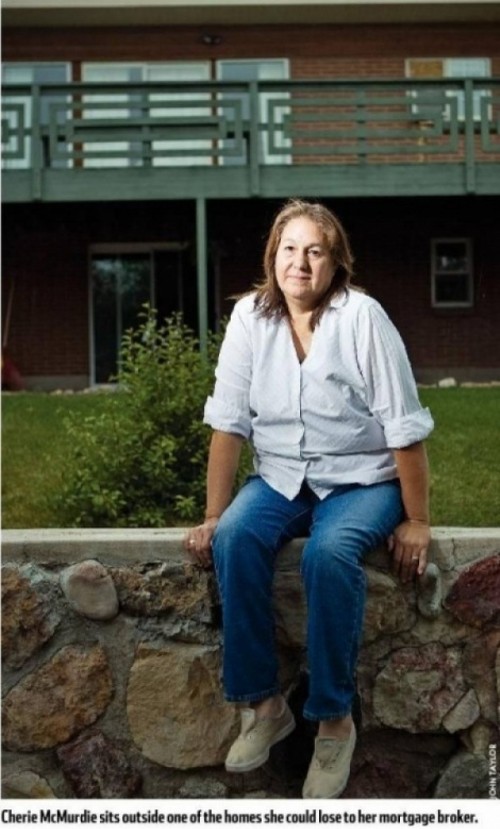Her loan cost her more than $100,000 in interest in one year and nearly left her and 11 family members homeless. For now, McMurdie’s fears of homelessness are at bay because a federal judge has issued an injunction in the case, halting the foreclosure.
City Weekly wrote about McMurdie’s troubles [“Mortgage Mess,” Sept. 17, 2009] before she filed suit in May in U.S. District Court against Lindon’s Good Neighbor Mortgage and owner Darren Lamont Eady. McMurdie was hoping to buy the house in the lot adjacent to the one she inherited, where some of her adult children and grandchildren could live—and they all would share the mortgage payment. That part worked out.
“My grandkids are right behind me, so it’s really convenient to see them,” McMurdie says. “They clean both yards. It’s really nice.”
But, the court fight that’s only just begun is not so nice. McMurdie’s complaint accuses Eady of violating federal lending laws by not disclosing all the details of the loan, not providing her with adequate documentation and representing his firm as being affiliated with a federal-housing program with a name similar to Good Neighbor Mortgage. Both sides agree that Eady lent McMurdie his own money—$245,000 from an equity line of credit on his personal residence—with a 36 percent annual percentage rate backed by McMurdie’s inherited home as collateral. So, when she couldn’t make her loan payments, she risked losing both houses. Both homes were set to be auctioned in May, the day after she filed suit and requested a temporary restraining order from U.S. District Court Judge Clark Waddoups, which he granted.
The heart of her complaint is about Eady’s motives: Was he really trying to help McMurdie, or did he set her up to fail for his own benefit? “I don’t know exactly what his thoughts were, but it seems to us that he just wanted to take both homes,” McMurdie says.
That’s not true, says Eady’s attorney, Blair Jackson. “What everybody thought, and [McMurdie] thought the same thing, was this was going to be a two- to three-month type of note and that it would be refinanced through [one of McMurdie’s] daughters,” Jackson says.
McMurdie could then apply for credit cards and other lending products to build credit history that would help her obtain a conventional mortgage with an interest rate much lower than the 36 percent Eady was charging her.
But, that didn’t happen—neither McMurdie nor her family members were able to obtain a mortgage quickly. At the end of one year, McMurdie’s debt to Eady had ballooned to $345,000. Eady’s affidavit says he saw the deal as an opportunity “to make a small profit,” but McMurdie’s attorney, Nathan Drage, says that this would have been a sweet and profitable deal for Eady if it weren’t for the lawsuit. “Even if he wasn’t planning on her not being able to [obtain a mortgage to pay off the loan], he could have easily figured he wins either way. If she doesn’t come up with it, he has two homes. If she does, he just made an incredible rate of return.”
There’s nothing wrong with that, exactly, except that Eady is a licensed mortgage broker with a fiduciary duty to protect his client’s best interests, Drage says, and McMurdie was not adequately informed of his conflicting interests. “There was no way [McMurdie] was going to have the knowledge or experience to know what just happened. She would have been looking to her loan broker to explain the problems and risks,” he says. But Eady was now also her lender, who “is allowed to pursue its own economic interests.”
Eady’s affidavit claims that McMurdie was informed of the details all along and is now feigning ignorance. Eady claims in a May affidavit that he and McMurdie discussed her “exit strategy” from the high-interest loan on multiple occasions. When City Weekly interviewed Eady in September and asked about that, however, Eady said “You’re asking the wrong person. I’m not the borrower, I’m the lender. Ask them about their exit strategies.”
Eady also feels victimized: Good Neighbor Mortgage has now closed as a result of negative publicity, Eady’s affidavit states. When you call his business now, he answers the phone with “Superior Lending.”
Eady declined to comment for this story, referring all questions to his attorney.
Michael Blackburn of Perfect Home Living, a Salt Lake City-based, nonprofit mortgage-fraud investigation firm, says it recently began interviewing other customers of Good Neighbor Mortgage that public records show received similar loans.
A spokesperson says the Utah Division of Real Estate’s investigation into the case is ongoing.
|
Jesse
Fruhwirth:
|
Speaking of Articles, City Weekl,
-
Playing Hooky
A day on the greens is a treat even for an unskilled golfer
- Jun 11, 2014
-
The Game of UDOT
Retire from state. Get job with private firm. Land state contract. Collect taxpayer millions. You win!
- Feb 26, 2014
-
Knowledge Is Power
I agree with Scott Renshaw that there are plenty of things many of us don’t know about Utah...
- Dec 24, 2013
- More »
More by Jesse Fruhwirth
-
Johnny's Rotten
Johnny Bangerter wants to move forward as an activist but just can't shake his racist punk past
- Apr 10, 2013
-
Right of Way
Eviction of Occupy SLC is a loss for community
- Nov 23, 2011
-
The Limbo Party
Redistricting: How low can Utah Dems go?
- May 19, 2011
- More »
Latest in News
Readers also liked…
-
Raise a glass for E.L.T Harrison, architect of the Beerhive building on Main
Small Lake City
- Oct 11, 2023





